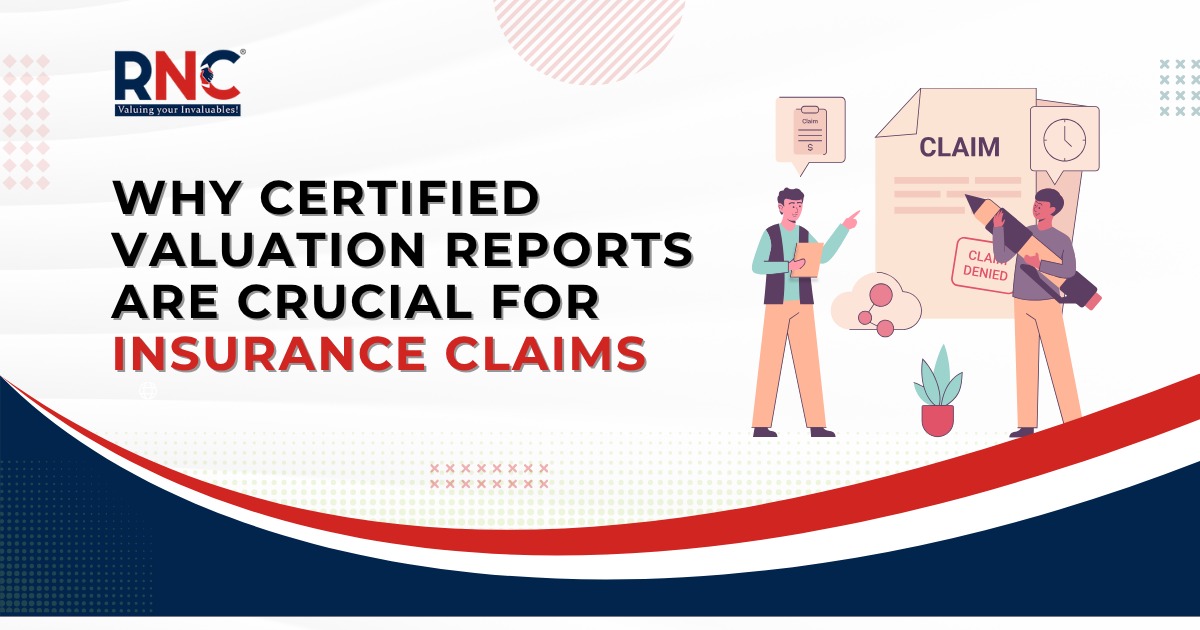
Certified valuation reports play a critical role in insurance claims by establishing the accurate value of assets before loss. Insurers rely on these reports to assess claim legitimacy, reduce disputes, and ensure settlements are aligned with policy terms and regulatory requirements.
In today’s complex insurance landscape, disputes over claim settlements are on the rise. One of the most effective ways to safeguard your business is through accurate and certified valuation reports for insurance claims.
A certified valuation report ensures that your insured assets are properly documented, valued according to recognized methodologies, and aligned with legal standards. This greatly reduces the risk of claim rejections or underpayment.
Read more : The importance of valuation for insurance
In India, regulatory bodies like the IRDAI emphasize the importance of transparent and verifiable valuation practices in the insurance process. Certified valuation reports, prepared by qualified valuers, provide this essential layer of credibility.
This guide will explain why certified valuation reports are vital for your insurance strategy, how they complement business valuation practices, and why they should be a core part of your valuation of insurance process.
What is a Certified Valuation Report?
A valuation report is an official document that presents the assessed value of a specific asset, business, or property. It is prepared through a systematic process based on accepted valuation methodologies and is used for various financial, legal, and regulatory purposes.
A certified valuation report goes a step further. It is prepared and signed by a licensed and qualified valuer, ensuring the report adheres to strict regulatory and professional standards. In India, this often means compliance with guidelines set by the IRDAI for insurance-related valuations or by the IBBI for business and asset valuations.
Certified valuation reports are recognized for their accuracy, transparency, and legal enforceability — making them crucial when substantiating insurance claims, especially during disputes or litigation.
Types of Valuation Reports
Depending on the asset and purpose, certified valuation reports can take various forms:
Business Valuation Report
A business valuation report assesses the economic value of an entire business or company. It is often required for mergers and acquisitions, investment decisions, and corporate restructuring, and can also support insurance coverage of intangible business assets.
Learn more : Business Valuation Key Approaches and When to Use Them
Asset Valuation Report
An asset valuation report focuses on the valuation of individual physical or financial assets such as plant and machinery, vehicles, real estate, or securities. These reports ensure that your assets are accurately insured and properly documented for claims.
Read more : plant and machinery valuation for insurance.
Insurance Claim Valuation Report
An insurance claim valuation report is specifically prepared to substantiate the value of assets covered under an insurance policy. It plays a vital role in ensuring that insurance claims reflect the true replacement or reinstatement cost, and that policyholders receive fair settlements.
Valuation Report Format
A certified valuation report generally includes the following sections:
- Executive Summary: A brief overview of the valuation purpose, scope, and conclusions.
- Description of the Asset/Business: Detailed description of the subject being valued.
- Valuation Methodology: Explanation of the methods used (e.g., Replacement Cost, Discounted Cash Flow, Market Approach).
- Assumptions and Limiting Conditions: Key assumptions and any limitations affecting the valuation.
- Valuer Credentials: Professional qualifications, certifications, and regulatory registrations of the valuers.
- Final Valuation Conclusion: The certified valuation figure.
- Supporting Appendices: Data references, charts, photographs, and legal documents.
This structured approach ensures that the valuation report not only supports business valuation needs but also aligns with regulatory requirements for the valuation of insurance — thereby enhancing its acceptance by insurers, regulators, and courts.
Why Are Certified Valuation Reports Crucial for Insurance Claims?
Legal Validity & Compliance with Insurance Policies
Insurance companies often reject or question claims supported by non-certified valuation reports. A certified report, prepared in line with IRDAI-accepted valuation methodologies, provides the legal validity and transparency insurers require for processing claims. Following these standards helps policyholders avoid unnecessary disputes and ensures smooth claim approval.
Protection from Underinsurance & Disputes
A certified valuation report protects businesses from under insurance by accurately reflecting the replacement value of insured assets. This ensures that claim settlements cover the full extent of potential losses. For example, a manufacturer avoided a ₹50 lakh shortfall in its claim after submitting an updated certified valuation that reflected recent equipment upgrades.
Increased Credibility in Litigation & Dispute Scenarios
In legal disputes or arbitration cases, certified valuation reports carry significant evidentiary weight. Courts and arbitration panels give more credence to valuations backed by licensed valuers and compliant with professional standards. This can be the deciding factor in ensuring a fair outcome when claim amounts are contested.
How the Certified Valuation Report Process Works
Step-by-Step Valuation Process for Insurance Claims
The process begins with engaging a qualified certified valuer, ensuring alignment with insurance and legal standards. The valuer conducts a detailed site inspection and data collection, assessing the condition and market relevance of the insured assets. Based on this, they apply an appropriate valuation methodology—such as Replacement Cost, DCF, or Market Approach—to determine accurate asset values. The final certified valuation report is meticulously drafted, reviewed, and issued to support your insurance claim.
Who Can Issue a Certified Valuation Report?
Only professionals recognized by regulatory bodies can issue certified valuation reports for insurance purposes. In India, this includes IRDAI Licensed Valuers, IBBI Registered Valuers, and members of globally respected institutions like RICS (Royal Institution of Chartered Surveyors) and IOVRVF (Institution of Valuers Registered Valuer Foundation). Choosing a certified expert ensures your valuation holds legal and regulatory credibility.
How Much Does a Certified Valuation Report Cost?
The cost of a certified valuation report varies based on asset type, complexity, and valuation scope. Typical charges may range from ₹25,000 for smaller asset valuations to ₹2–5 lakh or more for complex business valuation or large-scale industrial appraisals. Factors influencing cost include the number of assets, site locations, the need for specialized methodologies, and the level of supporting documentation required by insurers.
Choosing the Right Certified Valuation Report Provider
What to Look for in a Valuation Firm
Choosing the right valuation firm starts with verifying its credentials—ensure the firm employs IRDAI Licensed or IBBI Registered Valuers. Equally important is their experience in insurance valuations, as expertise in this specific domain ensures reports are fully aligned with insurer expectations and regulatory standards. Lastly, look for industry specialization; a firm with deep sector knowledge (manufacturing, real estate, healthcare, etc.) will deliver valuations that accurately reflect market dynamics and asset specifics.
Why Work With RNC Valuecon LLP for Your Insurance Valuation?
RNC Valuecon LLp brings unmatched expertise to the field of certified valuation reports. The firm’s core strengths lie in its team of IRDAI Licensed and IBBI Registered Valuers, combined with decades of valuation experience across diverse asset classes. RNC’s extensive industry experience—from corporate and MSMEs to banking, insurance, and government sectors—ensures that each report meets the highest standards of accuracy, compliance, and legal defensibility. Choosing RNC means choosing authoritative and trustworthy valuation solutions that protect your insurance interests.
Common Mistakes to Avoid in Insurance Valuations
Using outdated reports:
Relying on valuation reports that do not reflect the current market value of assets can result in claim underpayment or denial. Insurers expect up-to-date documentation aligned with current asset conditions and market rates.
Skipping site inspections:
A certified valuation report should be based on thorough site inspections. Skipping this step often leads to inaccurate or incomplete valuations, undermining the credibility of the report in claim negotiations or disputes.
Accepting non-certified valuations:
Using valuations prepared by non-licensed or non-certified individuals may not meet regulatory or insurer requirements. This exposes businesses to the risk of claim rejection or litigation challenges.
Not updating valuations regularly:
Failing to update valuations annually or after significant asset changes can leave businesses underinsured. Regular updates ensure that your insurance coverage reflects true asset values at all times.
Case Example (Manufacturing Sector, 2024–25)
A mid-sized textile manufacturer in Gujarat faced a fire accident in 2024.
-
With Certified Valuation Report: Claim settled within 60 days, full coverage approved.
-
Without Certified Valuation Report: Delays of 6+ months, partial claim disputed.
This real-world example shows how certified valuation reports speed up insurance claim settlements and reduce disputes.
Conclusion
Certified valuation reports play a critical role in protecting your business interests during insurance claims. From ensuring compliance to maximizing claim payouts, their importance cannot be overstated.
Don’t leave your insurance claims to chance.
Talk to our experts today
and secure your insurance claim with a certified valuation report — backed by industry-leading expertise and trusted valuation standards.
Contact us: 9737033380
Visit : RNC
FAQs
1. What is a certified valuation report?
A certified valuation report is an official document prepared by a licensed valuer that provides an accurate, legally compliant assessment of asset or business value.
2. Why is a certified valuation report important for insurance claims?
It ensures that your insurance claims are substantiated with verified data, increasing the likelihood of fair settlements and reducing dispute risks.
3. Can insurance companies reject non-certified valuation reports?
Yes. Many insurers require certified reports that comply with regulatory and professional standards. Non-certified reports may not be accepted.
4. Who is qualified to issue a certified valuation report in India?
IRDAI Licensed Valuers, IBBI Registered Valuers, and members of professional bodies like RICS or IOVRVF.
5.How long is a certified valuation report valid for insurance purposes?
Typically 1 year, but it should be updated after any significant asset changes or market shifts.

About the author:
Sahil Narula
Sahil Narula is the Managing Partner at RNC Valuecon LLP and a Registered Valuer with IBBI. He brings over a decade of experience in Valuation Services, Corporate Finance, and Advisory, having led numerous complex assignments under the Insolvency & Bankruptcy Code, 2016, Mergers & Acquisitions, Insurance, and Financial Reporting.
He is a regular speaker at national forums (ASSOCHAM, CII, ICAI, IBBI, Legal Era) and currently serves as Co-Chairman of ASSOCHAM’s National Council on Insolvency & Valuations and a member of CII’s Task Force on Insolvency & Bankruptcy.
🤝Connect with Sahil on LinkedIn.
